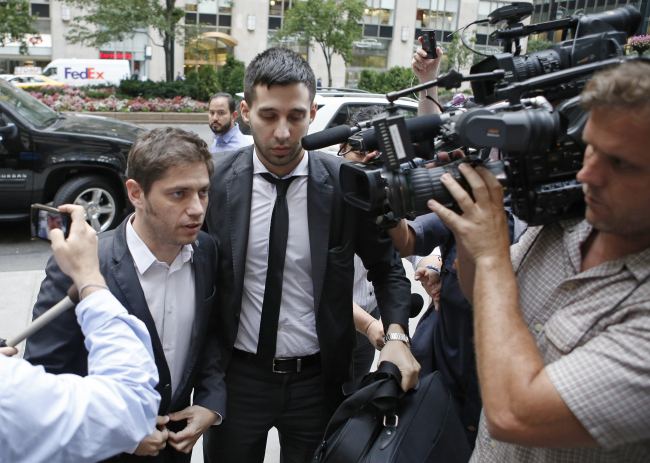NEW YORK (AFP) ― Last-ditch talks aimed at averting Argentina’s second default in 13 years were to resume Wednesday in New York, after Tuesday’s marathon session failed to reach a deal.
Buenos Aires has until the end of the day to resolve its dispute with so-called “holdout” hedge funds whose refusal to accept a write-down on debt it defaulted on in 2001 has pushed Latin America’s third-largest economy to the brink of a new default.
Economy Minister Axel Kicillof threw his weight behind the talks, flying in to New York to join the discussions overseen by the U.S. court-appointed mediator tasked with resolving the standoff, lawyer Dan Pollack.
After a marathon 12 hours of meetings, Kicillof said the group reached no deal. Negotiations were to resume later Wednesday but no hour was immediately set, he added.
“We continue to work at this with every bit of serious attention the issue deserves,” Kicillof told reporters.
Pollack said talks, “the first face-to-face discussions between the parties,” led to a “frank exchange of views and concerns.”
Buenos Aires has until the end of the day to resolve its dispute with so-called “holdout” hedge funds whose refusal to accept a write-down on debt it defaulted on in 2001 has pushed Latin America’s third-largest economy to the brink of a new default.
Economy Minister Axel Kicillof threw his weight behind the talks, flying in to New York to join the discussions overseen by the U.S. court-appointed mediator tasked with resolving the standoff, lawyer Dan Pollack.
After a marathon 12 hours of meetings, Kicillof said the group reached no deal. Negotiations were to resume later Wednesday but no hour was immediately set, he added.
“We continue to work at this with every bit of serious attention the issue deserves,” Kicillof told reporters.
Pollack said talks, “the first face-to-face discussions between the parties,” led to a “frank exchange of views and concerns.”

Judge Griesa’s ruling has trapped Argentina in a Catch-22, barring it from making payments on its restructured debt without also paying the holdouts the full $1.3 billion it owes them.
Argentina was due to make a $539 million payment on the restructured bonds on June 30. The 30-day grace period expires Wednesday.
But Argentina says paying the holdouts could expose it to claims for up to $100 billion from creditors who had agreed to take a 70 percent “haircut” after the 2001 default.
Buenos Aires got a boost Tuesday from a group of euro-denominated “exchange bonds” who appealed to Griesa to put a stay on his ruling.
In a petition to the court, the bondholders said they were willing to drop the so-called “RUFO clause” ― short for Rights Upon Future Offers ― under which they could launch claims for equal treatment with the holdouts.
But they said the judge would have to suspend his ruling long enough for that to be arranged.
Meanwhile, International Monetary Fund chief Christine Lagarde said an Argentine default would mean the mechanisms that allow struggling countries to restructure their debt would “have to be reviewed.”
After the 2001 default, Argentina negotiated its way back to solvency using what are known as collective-action clauses, which traditionally allow a majority of creditors to agree to a debt restructuring when a country is facing a crisis.
In Argentina’s case, 92 percent of creditors agreed to a write-down.
But Judge Griesa’s ruling has demonstrated the power of a handful of holdouts to scuttle such deals, leaving Argentina scrambling to bridge the gap between the expiry of the RUFO clause at the end of the year and the Wednesday deadline to make a payment on its restructured bonds.
Analysts have warned a default would deepen the economic malaise gripping Argentina, exacerbating its already troubling inflation ― prices rose 15 percent in the first half of the year ― and perhaps forcing another devaluation of the peso, already devalued 20 percent in January.
A default would also likely prolong Argentina’s isolation from international capital markets, which it has been locked out of since halting payments on its more than $100 billion in foreign debt in 2001.
That default, the largest ever at the time, plunged Argentina into an economic and social crisis it is still battling to bounce back from.
But unlike in 2001, when the economic crisis sparked a political crisis that turned the Argentine presidency into a revolving door, President Kirchner has managed to turn the current debt standoff into a political weapon.
Her government has branded holdouts NML Capital and Aurelius Capital Management “vulture funds” for buying up defaulted Argentine debt at discount rates, then suing for full payment.
That rhetoric has found a receptive audience both at home and with Kirchner’s fellow leftist leaders around Latin America.
At Tuesday’s Mercosur summit, Venezuelan President Nicolas Maduro said the five-country bloc had expressed its “militant solidarity” with Argentina.
“This is damaging not only to Argentina, it is damaging to all the countries of the south,” he said.
-
Articles by Korea Herald









![[Hello India] Hyundai Motor vows to boost 'clean mobility' in India](http://res.heraldm.com/phpwas/restmb_idxmake.php?idx=644&simg=/content/image/2024/04/25/20240425050672_0.jpg&u=)









